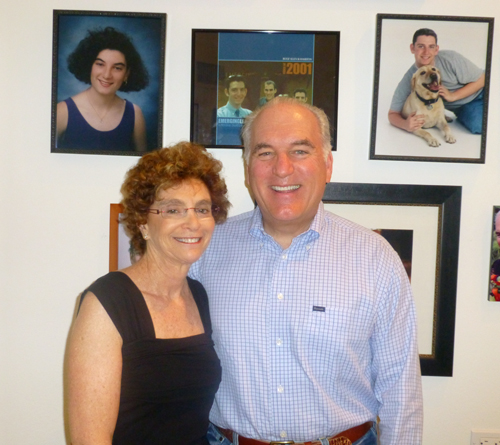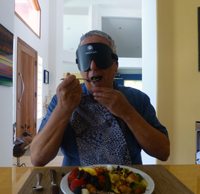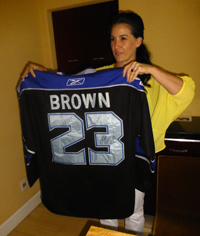
By Donald H. Harrison
DEL MAR, California– Come Wednesday, May 22, when supporters of the Foundation Fighting Blindness gather at the Hyatt Regency Hotel in La Jolla for a “Dining in the Dark” dinner– to be served and eaten with the lights out and the blackout curtains drawn — I just hope the attendees do a little better than I did identifying the food on their plates.
Jill and Evan Stone, who will be the honorees at this year’s fundraising dinner, arranged with Cheyanne Sauter, the foundation’s Los Angeles-based event director, to preview the dining experience for me. On a Friday morning, they had everything ready for me, including soft black goggles that completely shut out the light, and a plate of mystery foods for me to sample.
Self-conscious that I might drop something from my fork, I placed a napkin in my shirt to serve as a bib. After the goggles were secured around my eyes, Sauter brought a plate filled with a variety of foods to me. I found the plate, and slid my hands palm down along the table to the 3 p.m. position to find the knife and to the 9 p.m. position to locate the fork. I tentatively moved my fork on the plate, either spearing or shoveling the food onto the utensil with as much finesse as I could muster.
To my surprise, something strange can happen to your sense of taste when your eyes are blinded. Without visual cues, I was not at all certain what I was eating. In fact, I thought a strawberry was a sliced peach; I confused a cherry tomato with a grape; and I insulted a babka by mistaking it for a muffin. When I said a piece of zucchini was squash, I was technically right, but clearly the identification was far from precise.

The Stones told me that my experience was not at all unusual for a temporarily blind eater.
“I remember one year it took me 10 minutes to figure out what I was eating was mashed potatoes,” Evan reassured me. “Some people have short ribs, and think it is chicken.”
This information prompted a fleeting thought. You know those “blind taste tests” touted by television commercials? Assuming the results are reported 100 percent accurately, you’ve got to wonder how valid they are. Does it really matter if a blindfolded subject says one tomato tastes better than the other, if all the while he’s thinking it’s a grape?
Because I was concerned about not dropping my food onto the Stone floor, or poking a fork into my face, or otherwise embarrassing myself, I found that I was quite tentative as I ate while blindfolded. Although the vegetarian luncheon was delicious, I just picked at it, whereas had I been able to see it, I’m sure I’d have eaten ravenously.
“Probably, there is a visual cue feedback,” Evan speculated. “Food on my plate always says ‘eat me now’ but when you can’t see it, it can’t ‘talk to you’ visually; although it can through aroma. But you won’t have the thought process of ‘oh there is a peach, I like peaches, I think I’ll eat some.”
My experience was similar but not the same as the one attendees at the big fundraising dinner will be enjoying. They won’t be wearing blind folds. Instead the room will be so dark that no one will be able to see more than a few inches in front of themselves. Room monitors will have to wear night vision goggles to make sure they can come to the aid of anyone who might need it. There will be a blind wait staff who will navigate the room, using guide wires and stanchions to find the numbered tables as they bring the food and offer assistance to anyone who seems stumped in the darkened world.
Jill Stone, a national trustee of the Foundation Fighting Blindness, said initially these dinners were created to give people a taste of what it is like to be without sight. As it turned out, the dinners also proved to be quite a bit of fun for many diners seeking new sensory experiences.
With everyone in the dark, no one can see each other. So table manners really don’t matter. And pitch blackness conveys a sense of intimacy not normally present at a banquet. “When was the last time that I talked to a woman, other than my wife, in the dark — or anyone else for that matter?” Evan queried.
Sauter, who has supervised similar fundraising dinners around the country, says sometimes darkness seems to loosen diners’ tongues. “I have been at dinners where people divulge personal secrets that they shouldn’t — they’ve had no reason to tell me. I hadn’t known them — but they lost all their inhibitions.”
Sometimes, there are jokesters at the dinners who just cannot resist cutting up, Evan said. Like the time one year when the lights came on, and radio personality Joe Bauer was sitting without a shirt at his table. On a later occasion, somehow, in the dark, his pants somehow disappeared.
However much attendees whoop it up, the money raised at these dinners goes for a serious purpose. It fuels research against various blinding genetic diseases, including macular degeneration and retinitis pigmentosa. The latter condition involves a gradual narrowing of a person’s peripheral vision, so he or she might not be able to see their friends off to the side waving at them, or may not be able to see a bump on the road just in front of them. The genetic condition known as Usher Syndrome causes both deafness and vision loss. The Stones two adult children, Liz Nierenberg and Adam Stone, were born deaf and now are manifesting the symptoms of retinitis pigmentosa.
Today both live in Washington D.C. where Liz is the major gifts officer at Gallaudet University, which specializes in offering courses for the deaf. At that same institution, Adam is currently studying for a doctorate in educational neuroscience.
The dinner will salute the Stones for their advocacy for people with special needs–as well as Jill’s past service as a president of Jewish Family Service and Evan’s service on the Seacrest Foundation, which raises money for the Seacrest Village Retirement Homes. The tribute will also take note of the couple’s role in helping to found Congregation Beth Am in the Carmel Valley neighborhood of San Diego, and the fact that they both won Young Leadership Awards from the Jewish Federation of San Diego County. Evan also served as president of the Federation’s Ranch Breakfast Club.

Additionally, the dinner will feature a talk by Dr. William R. Brody, president of the Salk Institute for Biological Studies and former president of The Johns Hopkins University in Baltimore.
There will also be a silent auction, for which Evan Stone obtained a hockey jersey signed by Los Angeles Kings captain Dustin Brown. Another prize (which might be just perfect for the Stones, given the fact that they have two children in Washington D.C.) is a pair of roundtrip tickets to anywhere Jet Blue flies plus hotel accommodations. Another prize is a pair of seats right behind the San Diego Padres dugout.
Cheyanne Sauter at (866) 782-7330 will tell people interested in attending the dinner, for which tickets start at $300 per person, almost anything that they want to know — except exactly what is on the menu! If anyone has dietary restrictions– be they vegetarian, or gluten free, or no pork or shellfish–Sauter will make arrangements fitting those individual needs. More information is available work of the Foundation Fighting Blindness is available on its website.
*
Harrison is editor of San Diego Jewish World. He may be contacted at donald.harrison@sdjewishworld.com